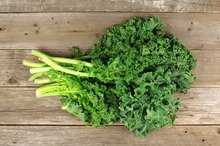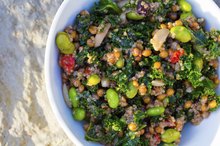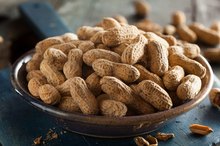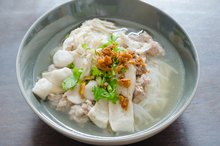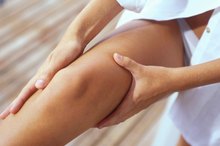Fever blisters, also called cold sores, are caused by the herpes simplex virus, type 1. The blisters can occur on your lips, cheeks, chin, gums or nostrils. You might experience a tingling sensation one to two days before the initial fever blister outbreak of fluid-filled blisters around your mouth. These blisters generally last between 10 and 14 days, although they can last longer. The exact cause varies, but illness, sunburn, wind, stress, hormonal changes or a weakened immune system can trigger an outbreak. A variety of vitamins can prevent or fight the herpes simplex virus and banish fever blisters.
Vitamin A
The recommended daily dosage for vitamin A is 900 mcg for men and 700 mcg for women. Foods rich in vitamin A include:
- beef
- cod liver oil
- eggs
- liver
- milk
- carrots
- kale
- spinach
Vitamin C
Vitamins for Mononucleosis
Learn More
Vitamin C is a water-soluble antioxidant that strengthens your immune system and lowers your risk of developing the herpes simplex virus, the virus commonly associated with fever blisters, according to Phyllis Balch, author of the book "Prescription for Nutritional Healing." Balch explains that vitamin C also aids in collagen production, hydrates your skin, decreases inflammation, accelerates the healing process and helps repair damaged tissues 1. The recommended daily dosage for vitamin C is 1,000 mg for adults. Foods rich in vitamin C include:
- strawberries
- cranberries
- grapefruits
- broccoli
- spinach
- kale
- Swiss chard
- oranges
- tomatoes
- Vitamin C is a water-soluble antioxidant that strengthens your immune system and lowers your risk of developing the herpes simplex virus, the virus commonly associated with fever blisters, according to Phyllis Balch, author of the book "Prescription for Nutritional Healing."
Zinc
The recommended daily dosage for zinc is 11 mg for men and 8 mg for women. Foods rich in zinc include:
- oysters
- beef shanks
- fortified cereals
- low-fat fruit yogurt
- baked beans
- chickpeas
- Swiss cheese
Calcium
Vitamins for an Overactive Bladder
Learn More
Foods rich in calcium include:
- plain yogurt
- sardines
- milk
- mozzarella
- salmon
- tofu
- ice cream
- pudding
- fortified soy milk
- tortillas
- sour cream
- ready-to-eat cereals
- spinach
Related Articles
References
- "Prescription for Nutritional Healing"; Phyllis Balch; 1996
- "Integrative Medicine"; Dr. David Rakel; 2007
- "Alternative Medicine Reviews"; Natural Remedies for Herpes Simplex; Dr. Alan Gaby; December 2005
- “Vitamins and Minerals Demystified”; Steve Blake; 2007
- “Burgerstein's Handbook of Nutrition: Micronutrients in the Prevention and Therapy of Disease”; Michael Zimmermann; 2001
- "Prevention's Healing with Vitamins"; Alice Feinstein; 1996
Writer Bio
R. Y. Langham served as a senior writer for "The Herald" magazine from 1996-99. Langham holds a Bachelor of Arts in English from Fisk University, a Master of Science in marriage and family therapy from Trevecca Nazarene University and a Ph.D in family psychology from Capella University. Dr. R.Y. Langham published her first psychological thriller in September 2011. It can be purchased on Amazon.com, Barnes&Noble.com and Lulu.com.




